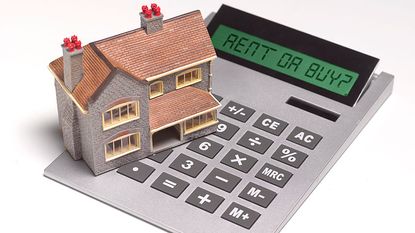Buying vs renting: as mortgage rates rise, which is cheaper?
In the UK, buying a home has traditionally been the preferred option over renting. But is that still true?


From falling house prices to rising mortgage rates, many potential property purchasers may be weighing up if now is a good time to buy a house or is it better to rent while mortgage rates are still high.
Average mortgage rates have shot up in recent weeks as swap rates rise amid fears of further interest rate rises by the Bank of England to tackle higher than expected inflation.
The average price for a two-year fixed mortgage as of late July is 6.81%, according to Moneyfacts, above the peak that rates reached in the aftermath of the mini-Budget in October.
Subscribe to MoneyWeek
Subscribe to MoneyWeek today and get your first six magazine issues absolutely FREE

Sign up to Money Morning
Don't miss the latest investment and personal finances news, market analysis, plus money-saving tips with our free twice-daily newsletter
Don't miss the latest investment and personal finances news, market analysis, plus money-saving tips with our free twice-daily newsletter
This is feeding into house prices as buyer budgets become more stretched, especially with other bills rising.
Average annual property price growth slowed from 3.2% in April to 1.9% in May, according to the Land Registry.
More recent data for June from the Halifax House Price Index suggests values are down 2.6% annually and declined 0.1% in June.
While potential homebuyers who are currently renting may be hopeful about predictions that property prices could fall by 10% or more this year, rents are also on the rise.
Renting has traditionally been more expensive than buying a house when you look at monthly accommodation costs.
The average UK house price is £285,861. A 75% loan-to-value mortgage at 6.81% based on the Land Registry’s average UK property price of £285,861 over 25 years would cost £1,489 per month.
In contrast, the average UK rent is currently £1,229 per month, according to HomeLet.
It costs more to rent in London, typically around £2,077 per month.
Even if rents are lower, the difference for tenants is that with other bills rising and low wage growth, renters may not have enough to save for a deposit for a mortgage and may struggle to meet strict affordability criteria.
But while buying property has always been touted as the better option over renting, it may not be the right course of action for everyone.
So, which is the better choice financially – buying or renting?
The pros and cons of renting
There are lots of decisions to make when looking at where to live and whether to rent or buy. Some of the positive aspects of renting include the following:
- Flexibility – you can move after as little as six months if the tenancy or area (or a new relationship that you’re ‘testing) doesn’t suit you
- You are not responsible for paying for the general upkeep of the property or fixing things when they go wrong as that will be down to the landlord
- If you rent a furnished property you don’t have to pay for furniture or white goods
- Getting on the rental ladder is theoretically easier than getting on the property ladder - though the increasing competitiveness of the rental market may null this argument
- The rental property’s value isn’t your personal concern
- There are no admin fees charged by landlords and letting agents
The major cons of renting include the following:
- Flexibility is also a disadvantage as much as it is an advantage: The duration of a tenancy agreement is generally decided by the landlord. The decision to increase rent or to sell up is also the landlord’s, leaving tenants with no option but to leave. The average length of a tenancy is two years, according to property website Rightmove. Flexibility in fact all points to a lack of stability.
- You won’t have the option of decorating (unless your landlord allows it)
- There might be restrictions on what you can do with the property
- There is little enforcement in place to protect renters from rogue landlords or unsafe properties. New legislation going through Parliament under the Renters Reform Bill should give tenants more rights by abolishing ‘no-fault’ section 21 evictions and letting them challenge rent rises.
- You may not be allowed a pet
The pros and cons of owning your own home
The decision to rent or buy will usually come down to the costs involved. The positives of being a property owner include:
- You will own the asset when the mortgage is paid off
- You have more stability than a renter as you won’t have to move out if a landlord decides they want to sell the property
- You can do what you want to the property, within planning regulations
Some of the downsides of owning a home include:
- You’ll have to pay fees such as stamp duty and legal fees
- You’re tied into a long contract; if you’re unable to pay your mortgage your house could be repossessed
- You may need to buy all your own furniture and white goods
- Owning a house can mean a lot of money is tied up within the property and isn’t readily available for other things, such as supporting children through university or even meeting the rising costs of everyday living
- There are even more costs associated with selling such as agency fees.
Is it cheaper to buy or rent?
Data historically shows it is cheaper to buy a home in the long run.
But recent rate changes have made the decision less clear cut for potential owners.
“Making the move from renting to home ownership can be difficult for many, as raising a sufficient deposit and then finding the right property can be challenging,” says Kim Kinnaird, mortgages director at Halifax.
“While a predicted fall in house prices this year will be welcome news for those looking to buy their first home, it doesn’t change the fact that getting on the property ladder remains expensive – a problem that is compounded when rents are high, impacting the ability to save.”
Michael Webb, managing director at Mortgage Republic Limited, said: “Historical low interest rates, and government intervention in the form of help to buy and stamp duty exemptions had buying a property as the cheaper option to renting, on a monthly basis, for over a decade.
“Rapidly increased interest rates, without a correction of note in property values, has meant that typically it will now be cheaper to rent than buy.”
Yet buying a house isn’t generally seen as a short-term option and so you’ll need to weigh up the costs over a longer period.
Mortgages are loans. It’s money you owe to the bank and have to pay back, with interest.
Interest rates have been inching higher over the last year, pushing up the cost for borrowers. Currently they sit at 5%, and analysts are predicting rates could hit 6.25% by the end of the year.
The Bank of England’s July Financial Stability Report predicts that a typical mortgage borrower coming off a fixed-rate deal during the second half of this year will see their repayments rise by around £220 per month if their mortgage rate rises by the expected 325 basis points.
The figures are more stark when broken down further though, with more than two million set to pay between £200 and £499 extra per month by the end of 2026 and a further one million set to see at least an extra £500 in costs.
But renting is also getting more expensive. Zoopla’s latest Rental Market Report showed rents are up 10.4% annually to £1,126 per month, with rents taking up the highest proportion of earnings in a decade at 28%.
Additionally, rental growth is fast outpacing earnings, which rose 7.3% between March and May 2023.
It’s worth considering that rental prices are unlikely to come down any time soon. While Zoopla estimates rental growth will slow to 8% this year, there is still a chronic supply vs demand imbalance.
There are risks that tougher renting rules and higher buy-to-let costs could lead landlords to exit – reducing supply – or push up rents further.
Is it worth buying a house?
On the surface, the costs associated with buying a house can seem daunting, but for some, the need to own their own home is visceral and the slog of saving for a number of years to afford it is worth it, especially if you’re planning to stay in the property for many years.
Home ownership also gives you a certain level of financial security. You know how much you have to pay on the mortgage and at the end of the loan term, the home is yours.
Additionally data shows currently the market is favouring buyers. Sellers are cutting £14,000 off their asking prices, and discounts to asking prices are larger than in the pre-pandemic years.
Plus, rents can always go up and if you can’t pay, you could be thrown out.
Recent rises to mortgage rates have also increased the prices of buy-to-let mortgages and these costs are likely to be filtered down to tenants.
Imogen Sporle, head of regulated and term finance at Finanze, said: “Regarding the very common question I get at the moment of ‘As mortgage rates are going up is it cheaper to rent than get a mortgage?’, my answer to this is a hard ‘no’, and I think it always will be regardless of how high mortgage rates go up.
“This is because the majority of landlords have mortgages on the properties they are letting out, and although their mortgage payments are slightly lower as they often pay them on an interest-only basis, due to the lender's debt service coverage (DSC) ratio they will still have to increase the rent they charge when the mortgage rates increase.”
Is renting a waste of money?
There is a prevailing view that renting is a waste of money and that it’s better to be paying your own mortgage rather than hand over your hard earned money to a landlord.
But this ignores the realities of life.
Many people rent because they can’t afford to buy; there are four million households in the social rented sector in England.
Some people rent because they don’t know if they want to take on the responsibilities of home ownership when they’re not certain about where to live – after all, it is a big commitment.
In the short-term, renting can also make more sense financially.
Rebecca Goodman is an award-winning freelance journalist who specialises in insurance and consumer affairs.
For the past ten years she has worked for many national newspapers and magazines including The Independent, The Sun, The Mail on Sunday, This is Money, MoneySavingExpert, and Stylist. Rebecca also works for a number of specialist publications.
Her work in consumer journalism is driven by wanting to help people to make their money work harder, exposing wrongdoing in the financial services industry, and de-mystifying money issues.#
Rebecca is originally from Hampshire, but now lives in Cambridgeshire with her husband and two young daughters.
-
-
 Top-quality small companies with big scope for long-term growth
Top-quality small companies with big scope for long-term growthA professional investor tells us where he’d put his money. This week: Dr Gareth Blades, analyst at Amati Global Investors, highlights three favourites.
By Nicole García Mérida Published
-
 Starling Bank hikes fixed savings rate to 5.25%
Starling Bank hikes fixed savings rate to 5.25%Starling Bank has hiked the rate on its fixed savings which has shot up from 3.25% to 5.25% - but how does it compare to the rest of the market?
By Vaishali Varu Published
-
 Investing in wine: how Cru Wine is reaching new audiences
Investing in wine: how Cru Wine is reaching new audiencesTips Gregory Swartberg, founder of fine wine specialist Cru Wine, talks to Chris Carter about how to start a wine collection
By Chris Carter Published
-
 Small companies with big potential
Small companies with big potentialMichael Taylor of Shifting Shares reviews his 2023 picks and highlights more promising minnows.
By Michael Taylor Published
-
 The MoneyWeek portfolio of investment trusts – July 2023 update
The MoneyWeek portfolio of investment trusts – July 2023 updateTips A decade ago we set up the MoneyWeek portfolio of investment trusts. They remain a compelling long-term bet says Rupert Hargreaves
By Rupert Hargreaves Published
-
 Women lead the way with ethical investments
Women lead the way with ethical investmentsDemand for more ethical investments has soared – and women are more likely to opt for them. Annabelle Williams, personal finance specialist at Nutmeg, takes a look at why.
By Annabelle Williams Published
-
 BoE: Mortgage payments to rise by £220 a month for households
BoE: Mortgage payments to rise by £220 a month for householdsMillions of households can expect a mortgage spike of around £200 a month - and some may even reach a extra £1,000 a month, the Bank of England warns
By Marc Shoffman Published
-
 What happened to Thames Water?
What happened to Thames Water?Thames Water, the UK’s biggest water company could go under due to mismanagement and debt. We look into how the company got itself into this position, and what investors should expect.
By Simon Wilson Last updated
-
 Where to invest in the metals that will engineer the energy transition
Where to invest in the metals that will engineer the energy transitionA professional investor tells us where he’d put his money. This week: John Ciampaglia, manager of the Sprott Energy Transition Materials UCITS ETF.
By Nicole García Mérida Published
-
 How investors can profit from high food prices
How investors can profit from high food pricesThe latest furore over grocery prices will die down, says David Stevenson. But the long-term outlook for soft commodities remains bullish. These are the stocks investors can buy to profit from high food prices.
By David J Stevenson Published









